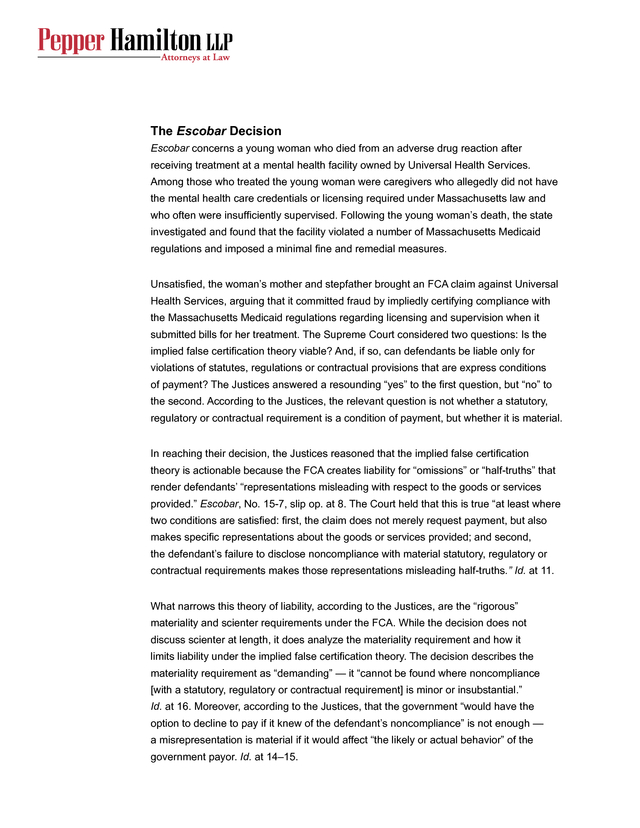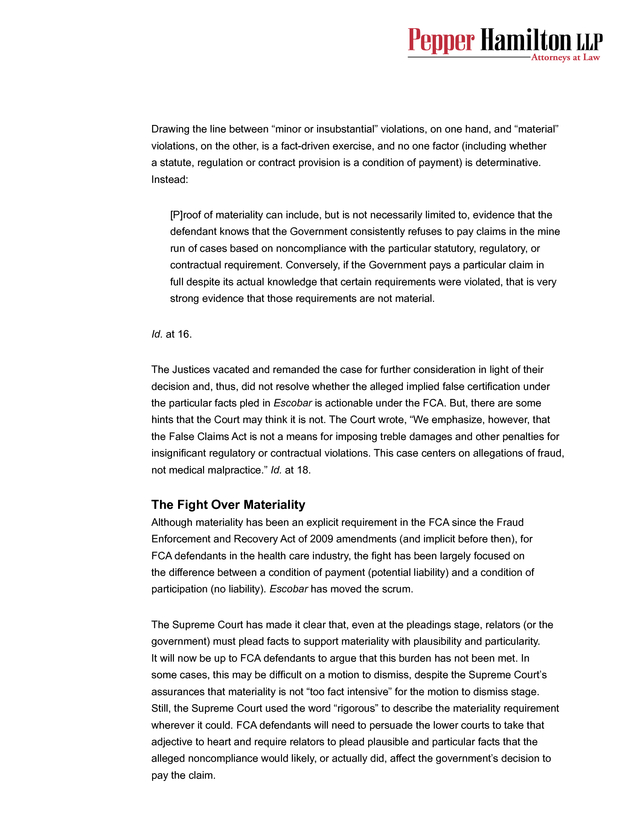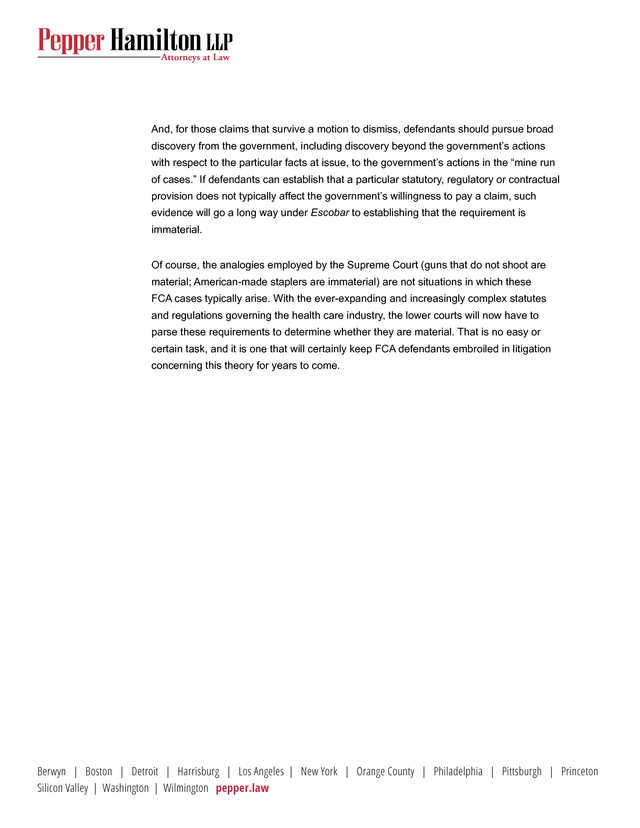Materiality Is the New Condition of Payment: The Implied False Certification Theory After Escobar – July 8 2016
Pepper Hamilton
Description
Materiality Is the New Condition
of Payment: The Implied False
Certification Theory After Escobar
CLIENT ALERT | July 8, 2016
Thomas M. Gallagher | gallaghert@pepperlaw.com
Abigail A. Hazlett | hazletta@pepperlaw.com
THE SUPREME COURT HAS MADE IT CLEAR THAT, EVEN AT THE PLEADINGS STAGE,
RELATORS (OR THE GOVERNMENT) MUST PLEAD FACTS TO SUPPORT MATERIALITY
WITH PLAUSIBILITY AND PARTICULARITY.
For False Claims Act (FCA) defendants who were hoping to be rid of the dreaded implied
false certification theory of liability, the U.S. Supreme Court’s unanimous decision in
Universal Health Services, Inc.
v. United States ex rel. Escobar (available at http://www. supremecourt.gov/opinions/15pdf/15-7_a074.pdf) surely was a disappointment.
But, despite upholding the viability of the theory, the Court’s decision provides a pathway for defendants to defeat such claims: materiality. That pathway may be uncertain right now, but those defending against FCA lawsuits certainly will be able to rely on Escobar to respond to overbroad claims by the government and/or relator’s counsel, emphasizing the Court’s holding that the FCA is not a “blunt instrument” and only provides a remedy for defendants who act with fraudulent intent. THIS PUBLICATION MAY CONTAIN ATTORNEY ADVERTISING The material in this publication was created as of the date set forth above and is based on laws, court decisions, administrative rulings and congressional materials that existed at that time, and should not be construed as legal advice or legal opinions on specific facts. The information in this publication is not intended to create, and the transmission and receipt of it does not constitute, a lawyer-client relationship.
Please send address corrections to phinfo@pepperlaw.com. © 2016 Pepper Hamilton LLP. All Rights Reserved. . The Escobar Decision Escobar concerns a young woman who died from an adverse drug reaction after receiving treatment at a mental health facility owned by Universal Health Services. Among those who treated the young woman were caregivers who allegedly did not have the mental health care credentials or licensing required under Massachusetts law and who often were insufficiently supervised. Following the young woman’s death, the state investigated and found that the facility violated a number of Massachusetts Medicaid regulations and imposed a minimal fine and remedial measures. Unsatisfied, the woman’s mother and stepfather brought an FCA claim against Universal Health Services, arguing that it committed fraud by impliedly certifying compliance with the Massachusetts Medicaid regulations regarding licensing and supervision when it submitted bills for her treatment. The Supreme Court considered two questions: Is the implied false certification theory viable? And, if so, can defendants be liable only for violations of statutes, regulations or contractual provisions that are express conditions of payment? The Justices answered a resounding “yes” to the first question, but “no” to the second. According to the Justices, the relevant question is not whether a statutory, regulatory or contractual requirement is a condition of payment, but whether it is material. In reaching their decision, the Justices reasoned that the implied false certification theory is actionable because the FCA creates liability for “omissions” or “half-truths” that render defendants’ “representations misleading with respect to the goods or services provided.” Escobar, No.
15-7, slip op. at 8. The Court held that this is true “at least where two conditions are satisfied: first, the claim does not merely request payment, but also makes specific representations about the goods or services provided; and second, the defendant’s failure to disclose noncompliance with material statutory, regulatory or contractual requirements makes those representations misleading half-truths.” Id.
at 11. What narrows this theory of liability, according to the Justices, are the “rigorous” materiality and scienter requirements under the FCA. While the decision does not discuss scienter at length, it does analyze the materiality requirement and how it limits liability under the implied false certification theory. The decision describes the materiality requirement as “demanding” — it “cannot be found where noncompliance [with a statutory, regulatory or contractual requirement] is minor or insubstantial.” Id.
at 16. Moreover, according to the Justices, that the government “would have the option to decline to pay if it knew of the defendant’s noncompliance” is not enough — a misrepresentation is material if it would affect “the likely or actual behavior” of the government payor. Id.
at 14–15. . Drawing the line between “minor or insubstantial” violations, on one hand, and “material” violations, on the other, is a fact-driven exercise, and no one factor (including whether a statute, regulation or contract provision is a condition of payment) is determinative. Instead: [P]roof of materiality can include, but is not necessarily limited to, evidence that the defendant knows that the Government consistently refuses to pay claims in the mine run of cases based on noncompliance with the particular statutory, regulatory, or contractual requirement. Conversely, if the Government pays a particular claim in full despite its actual knowledge that certain requirements were violated, that is very strong evidence that those requirements are not material. Id. at 16. The Justices vacated and remanded the case for further consideration in light of their decision and, thus, did not resolve whether the alleged implied false certification under the particular facts pled in Escobar is actionable under the FCA. But, there are some hints that the Court may think it is not.
The Court wrote, “We emphasize, however, that the False Claims Act is not a means for imposing treble damages and other penalties for insignificant regulatory or contractual violations. This case centers on allegations of fraud, not medical malpractice.” Id. at 18. The Fight Over Materiality Although materiality has been an explicit requirement in the FCA since the Fraud Enforcement and Recovery Act of 2009 amendments (and implicit before then), for FCA defendants in the health care industry, the fight has been largely focused on the difference between a condition of payment (potential liability) and a condition of participation (no liability).
Escobar has moved the scrum. The Supreme Court has made it clear that, even at the pleadings stage, relators (or the government) must plead facts to support materiality with plausibility and particularity. It will now be up to FCA defendants to argue that this burden has not been met. In some cases, this may be difficult on a motion to dismiss, despite the Supreme Court’s assurances that materiality is not “too fact intensive” for the motion to dismiss stage. Still, the Supreme Court used the word “rigorous” to describe the materiality requirement wherever it could. FCA defendants will need to persuade the lower courts to take that adjective to heart and require relators to plead plausible and particular facts that the alleged noncompliance would likely, or actually did, affect the government’s decision to pay the claim. .
And, for those claims that survive a motion to dismiss, defendants should pursue broad discovery from the government, including discovery beyond the government’s actions with respect to the particular facts at issue, to the government’s actions in the “mine run of cases.” If defendants can establish that a particular statutory, regulatory or contractual provision does not typically affect the government’s willingness to pay a claim, such evidence will go a long way under Escobar to establishing that the requirement is immaterial. Of course, the analogies employed by the Supreme Court (guns that do not shoot are material; American-made staplers are immaterial) are not situations in which these FCA cases typically arise. With the ever-expanding and increasingly complex statutes and regulations governing the health care industry, the lower courts will now have to parse these requirements to determine whether they are material. That is no easy or certain task, and it is one that will certainly keep FCA defendants embroiled in litigation concerning this theory for years to come. Berwyn | Boston | Detroit | Harrisburg | Los Angeles | New York | Orange County | Philadelphia | Pittsburgh | Princeton Silicon Valley | Washington | Wilmington pepper.law .
v. United States ex rel. Escobar (available at http://www. supremecourt.gov/opinions/15pdf/15-7_a074.pdf) surely was a disappointment.
But, despite upholding the viability of the theory, the Court’s decision provides a pathway for defendants to defeat such claims: materiality. That pathway may be uncertain right now, but those defending against FCA lawsuits certainly will be able to rely on Escobar to respond to overbroad claims by the government and/or relator’s counsel, emphasizing the Court’s holding that the FCA is not a “blunt instrument” and only provides a remedy for defendants who act with fraudulent intent. THIS PUBLICATION MAY CONTAIN ATTORNEY ADVERTISING The material in this publication was created as of the date set forth above and is based on laws, court decisions, administrative rulings and congressional materials that existed at that time, and should not be construed as legal advice or legal opinions on specific facts. The information in this publication is not intended to create, and the transmission and receipt of it does not constitute, a lawyer-client relationship.
Please send address corrections to phinfo@pepperlaw.com. © 2016 Pepper Hamilton LLP. All Rights Reserved. . The Escobar Decision Escobar concerns a young woman who died from an adverse drug reaction after receiving treatment at a mental health facility owned by Universal Health Services. Among those who treated the young woman were caregivers who allegedly did not have the mental health care credentials or licensing required under Massachusetts law and who often were insufficiently supervised. Following the young woman’s death, the state investigated and found that the facility violated a number of Massachusetts Medicaid regulations and imposed a minimal fine and remedial measures. Unsatisfied, the woman’s mother and stepfather brought an FCA claim against Universal Health Services, arguing that it committed fraud by impliedly certifying compliance with the Massachusetts Medicaid regulations regarding licensing and supervision when it submitted bills for her treatment. The Supreme Court considered two questions: Is the implied false certification theory viable? And, if so, can defendants be liable only for violations of statutes, regulations or contractual provisions that are express conditions of payment? The Justices answered a resounding “yes” to the first question, but “no” to the second. According to the Justices, the relevant question is not whether a statutory, regulatory or contractual requirement is a condition of payment, but whether it is material. In reaching their decision, the Justices reasoned that the implied false certification theory is actionable because the FCA creates liability for “omissions” or “half-truths” that render defendants’ “representations misleading with respect to the goods or services provided.” Escobar, No.
15-7, slip op. at 8. The Court held that this is true “at least where two conditions are satisfied: first, the claim does not merely request payment, but also makes specific representations about the goods or services provided; and second, the defendant’s failure to disclose noncompliance with material statutory, regulatory or contractual requirements makes those representations misleading half-truths.” Id.
at 11. What narrows this theory of liability, according to the Justices, are the “rigorous” materiality and scienter requirements under the FCA. While the decision does not discuss scienter at length, it does analyze the materiality requirement and how it limits liability under the implied false certification theory. The decision describes the materiality requirement as “demanding” — it “cannot be found where noncompliance [with a statutory, regulatory or contractual requirement] is minor or insubstantial.” Id.
at 16. Moreover, according to the Justices, that the government “would have the option to decline to pay if it knew of the defendant’s noncompliance” is not enough — a misrepresentation is material if it would affect “the likely or actual behavior” of the government payor. Id.
at 14–15. . Drawing the line between “minor or insubstantial” violations, on one hand, and “material” violations, on the other, is a fact-driven exercise, and no one factor (including whether a statute, regulation or contract provision is a condition of payment) is determinative. Instead: [P]roof of materiality can include, but is not necessarily limited to, evidence that the defendant knows that the Government consistently refuses to pay claims in the mine run of cases based on noncompliance with the particular statutory, regulatory, or contractual requirement. Conversely, if the Government pays a particular claim in full despite its actual knowledge that certain requirements were violated, that is very strong evidence that those requirements are not material. Id. at 16. The Justices vacated and remanded the case for further consideration in light of their decision and, thus, did not resolve whether the alleged implied false certification under the particular facts pled in Escobar is actionable under the FCA. But, there are some hints that the Court may think it is not.
The Court wrote, “We emphasize, however, that the False Claims Act is not a means for imposing treble damages and other penalties for insignificant regulatory or contractual violations. This case centers on allegations of fraud, not medical malpractice.” Id. at 18. The Fight Over Materiality Although materiality has been an explicit requirement in the FCA since the Fraud Enforcement and Recovery Act of 2009 amendments (and implicit before then), for FCA defendants in the health care industry, the fight has been largely focused on the difference between a condition of payment (potential liability) and a condition of participation (no liability).
Escobar has moved the scrum. The Supreme Court has made it clear that, even at the pleadings stage, relators (or the government) must plead facts to support materiality with plausibility and particularity. It will now be up to FCA defendants to argue that this burden has not been met. In some cases, this may be difficult on a motion to dismiss, despite the Supreme Court’s assurances that materiality is not “too fact intensive” for the motion to dismiss stage. Still, the Supreme Court used the word “rigorous” to describe the materiality requirement wherever it could. FCA defendants will need to persuade the lower courts to take that adjective to heart and require relators to plead plausible and particular facts that the alleged noncompliance would likely, or actually did, affect the government’s decision to pay the claim. .
And, for those claims that survive a motion to dismiss, defendants should pursue broad discovery from the government, including discovery beyond the government’s actions with respect to the particular facts at issue, to the government’s actions in the “mine run of cases.” If defendants can establish that a particular statutory, regulatory or contractual provision does not typically affect the government’s willingness to pay a claim, such evidence will go a long way under Escobar to establishing that the requirement is immaterial. Of course, the analogies employed by the Supreme Court (guns that do not shoot are material; American-made staplers are immaterial) are not situations in which these FCA cases typically arise. With the ever-expanding and increasingly complex statutes and regulations governing the health care industry, the lower courts will now have to parse these requirements to determine whether they are material. That is no easy or certain task, and it is one that will certainly keep FCA defendants embroiled in litigation concerning this theory for years to come. Berwyn | Boston | Detroit | Harrisburg | Los Angeles | New York | Orange County | Philadelphia | Pittsburgh | Princeton Silicon Valley | Washington | Wilmington pepper.law .

















